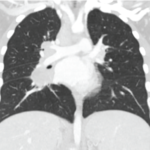High incidence of metabolic disease and concurrent inflammation increases risk
The ACR/CHEST ILD Guidelines in Practice, a video
In collaboration with the American College of Chest Physicians, the ACR released two new comprehensive guidelines aimed at improving the screening, monitoring, and treatment of patients with interstitial lung disease (ILD) secondary to systemic autoimmune rheumatic diseases (SARDs). Recently, Sindhu R. Johnson, MD, PhD, professor of medicine at the University of Toronto, Canada, director of the Toronto Scleroderma Program and principal investigator for the guideline, and Elana J. Bernstein, MD, MSc, Florence Irving associate professor of medicine in the Division of Rheumatology at Columbia University, New York City, and co-first author, presented a webinar to talk about how the guidelines were developed and present some of the recommendations and their rationale: Watch the recording now!
When Lupus Research is a Family Affair
Following sisters of SLE patients may shed light on risk factors and progression of the disease
Strides in Recognition and Management of Joint Hypermobility Syndrome
Strides in recognition and management of joint hypermobility syndrome
State-of-the-Art Clinical Symposium Sessions Available Through SessionSelect
Did a busy practice prevent you from getting to Chicago in April for the ACR’s 2010 State-of-the-Art Clinical Symposium? Still want the latest news and education in rheumatology? Or, did you attend the meeting and want to revisit some of your favorite sessions? Nineteen general-session presentations from the symposium are now available on ACR’s SessionSelect, allowing you to tailor your learning experience to your educational needs without leaving your home or office, saving time and money.
Health Professional Careers in Rheumatology Research
Robert McLean, DSc, MPH, is an assistant research scientist at the Hebrew SeniorLife Institute for Aging Research in Boston, and his primary research interests lie in the epidemiology of osteoporosis and related fractures. After working in epidemiology for over 10 years, Dr. McLean recently established himself as an independent investigator without significant prior research experience, thanks to the help of an REF research award designed specifically for early career investigators.
Integrating Immunology and Biologics into Clinical Practice
With the rapid expansion of new classes of medications, clinical practice has changed dramatically, and rheumatology health professionals must have a fundamental knowledge of immunology and the mechanisms of action of the biologic agents that have emerged with this expansion. Familiarity with the predrug screening recommended for biologic agents and the appropriate safety and disease monitoring necessary when a person uses these products is essential for the best patient outcomes. Additionally, being able to obtain drug plan authorization for use of biologics and being able to educate patients and their families or support team members about the financial considerations of these drugs helps to ensure best rheumatology practice.
Within Our Reach–Funded Study Finds Increased Depression Risk Among Some RA Patients
A study recently published in Arthritis & Rheumatism found that a cohort of patients from multiethnic backgrounds who all had rheumatoid arthritis (RA) had nearly double the rate of depressive symptoms compared with middle-class white patients with RA.1 The study also examined predictors of depression, and concluded that physical disability—not acute disease activity—is the principal predictor of depression in patients with RA.
2010 Annual Scientific Meeting Ramping Up
Building on the success of last year’s attendance-breaking ACR/ARHP Annual Scientific Meeting, the ACR and ARHP planning committees are offering an annual meeting program that that will exceed expectations. Plan to join your colleagues in Atlanta November 6–11 to benefit from both high-quality rheumatology education and a unique blend of cosmopolitan experiences and cultural charm—all of which will quench an array of intellectual, cultural, and culinary appetites.
The Most Cost-Effective Diagnosis Is the Correct Diagnosis
Comments on the Medicare decision to eliminate consultation codes
The Good and Bad of Healthcare Reform
Even though the law was passed, the work of reform is just beginning
- « Previous Page
- 1
- …
- 280
- 281
- 282
- 283
- 284
- …
- 309
- Next Page »
